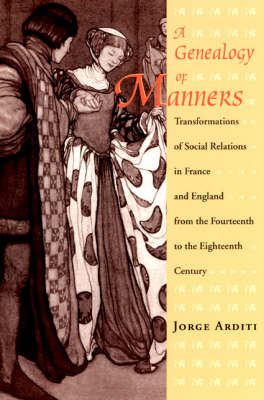
A Genealogy of Manners
Transformations of Social Relations in France and England from the Fourteenth to the Eighteenth Century
Seiten
1998
University of Chicago Press (Verlag)
978-0-226-02584-1 (ISBN)
University of Chicago Press (Verlag)
978-0-226-02584-1 (ISBN)
Arditi's study offers a history of mores from the High Middle Ages to the Enlightenment. Drawing on the ideas of Elias, Foucault and Bourdieu, as well as through analysing courtesy manuals and etiquette books of the times, he examines the relationship between power and social practices and traces how power changes over the centuries.
Jorge Arditi's study offers a history of mores from the High Middle Ages to the Enlightenment. Drawing on the pioneering ideas of Norbert Elias, Michel Foucault, and Pierre Bourdieu, the text examines the relationship between power and social practices and traces how power changes over time. Analyzing courtesy manuals and etiquette books from the 13th to the 18th century, Arditi shows how the dominant classes of a society were able to create a system of social relations and put it into operation. The result was an infrastructure in which these classes could successfully exert power. He explores how the ecclesiastical authorities of the Middle Ages, the monarchies from the 15th through the 17th century, and the aristocracies during the early stages of modernity all forged their own codes of manners within the confines of another, dominant order. Arditi goes on to describe how each of these different groups, through the sustained deployment of their own forms of relating with one another, gradually moved into a position of dominance.
Jorge Arditi's study offers a history of mores from the High Middle Ages to the Enlightenment. Drawing on the pioneering ideas of Norbert Elias, Michel Foucault, and Pierre Bourdieu, the text examines the relationship between power and social practices and traces how power changes over time. Analyzing courtesy manuals and etiquette books from the 13th to the 18th century, Arditi shows how the dominant classes of a society were able to create a system of social relations and put it into operation. The result was an infrastructure in which these classes could successfully exert power. He explores how the ecclesiastical authorities of the Middle Ages, the monarchies from the 15th through the 17th century, and the aristocracies during the early stages of modernity all forged their own codes of manners within the confines of another, dominant order. Arditi goes on to describe how each of these different groups, through the sustained deployment of their own forms of relating with one another, gradually moved into a position of dominance.
| Erscheint lt. Verlag | 4.12.1998 |
|---|---|
| Sprache | englisch |
| Maße | 16 x 23 mm |
| Gewicht | 482 g |
| Themenwelt | Sachbuch/Ratgeber |
| Geschichte ► Teilgebiete der Geschichte ► Kulturgeschichte | |
| Geschichte ► Teilgebiete der Geschichte ► Sozialgeschichte | |
| Sozialwissenschaften ► Soziologie | |
| ISBN-10 | 0-226-02584-5 / 0226025845 |
| ISBN-13 | 978-0-226-02584-1 / 9780226025841 |
| Zustand | Neuware |
| Haben Sie eine Frage zum Produkt? |
Mehr entdecken
aus dem Bereich
aus dem Bereich
der stille Abschied vom bäuerlichen Leben in Deutschland
Buch | Hardcover (2023)
C.H.Beck (Verlag)
23,00 €
vom Mittelalter bis zur Gegenwart
Buch | Softcover (2024)
C.H.Beck (Verlag)
12,00 €
eine Geschichte der Welt in 99 Obsessionen
Buch | Hardcover (2023)
Klett-Cotta (Verlag)
22,00 €


